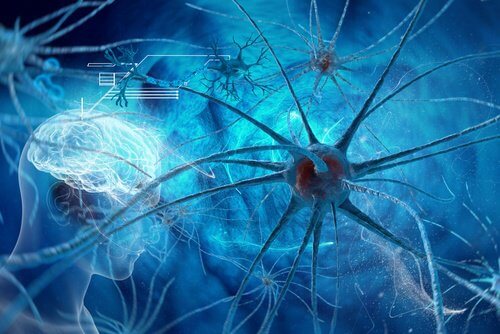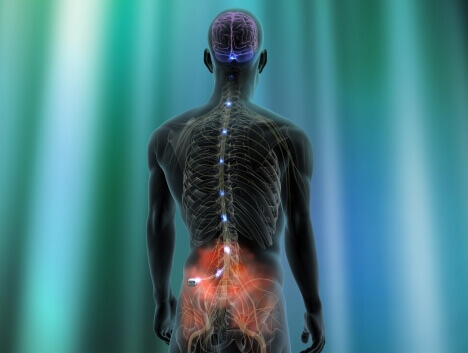Neuropathic Pain: That Annoying Nighttime Pain


Written and verified by psychologist Valeria Sabater
Neuropathic pain is characterized by pain, itching, or numbness in the hands and feet that intensifies at night.
This type of disorder is very similar to an electrical shock. Sometimes it feels like burning, tingling, and while it can disappear for weeks, it can later return with a vengeance. It can even keep you from getting deep sleep.
Neuropathic pain affects 10% of the population. It steals away your quality of life, and sometimes there is no effective treatment than can help the problem disappear completely. It can also be accompanied by other symptoms.
If you’re suffering from this, we recommend seeing a specialist. There are various different types of therapeutic focuses. Thus, you’ll most likely have to try whichever therapy adapts to your own needs.
Read more here: How the Spinal Column Is Connected to the Organs
We’re going to explain some of the basic keys below. In addition, we’ll explain why this pain intensifies at night.
What causes neuropathic pain?
Neuropathic pain is caused by a slight change in the nervous system. It’s also associated with people that suffer from chronic pain. Sometimes, it’s associated with small lesions in the spinal column that lead to these “shocks”. Oftentimes the discomfort is localized in the trigeminal nerve in the face or in the intercostal nerves.
It’s a very complex type of pain. So much so, that it goes beyond the classic symptoms of hands and feet “falling asleep”.
Specialists will always be the ones to give you an appropriate diagnosis according to your symptoms.

What symptoms could I experience?
Neuropathic pain is chronic. As we stated at the beginning of this article, it comes and goes. But patients always complain that the pain becomes unbearable at night.
Discomfort that’s localized in the feet and hands also generally comes with other sensitivities like feeling pain when someone grazes your skin.
Why is the discomfort more intense at night?
Specialists say that neuropathic pain is often misdiagnosed. If this is true, it could be due to several different reasons:
- The pain is not related to bones or joints. We’re talking about nerves and neuroglia. Thus, this type of central sensitivity is located in the glia cells.
- The neuropathic pain isn’t eased with aspirin. In fact, patients often feel exasperated when they can’t find relief. If you’re unable to find a solution, you could end up feeling defeated.
If your pain intensifies at night, it’s because you’re finally still. When you’re moving, the movements soothe your body to a certain extent, thereby calming the nerve disruptions.
So when you rest for a while, the electrical shocks become more intense. The muscles are no longer being worked, and now the tension is concentrated even more in your extremities, such as your feet and hands.
Hypersensitivity also increases at night. It’s like having pins and needles all over your body.

Is there any effective treatment for neuropathic pain?
You’re facing a chronic ailment. This requires, above all, a certain level of understanding.
This discomfort, the pain that sometimes renders you unable to do things and that robs you of sleep, is always going to be with you. But the key is not to give up, but instead continually search for a good quality of life.
This is a very personal battle. This means that while a certain kind of treatment may work well for a friend, you might need something different.
Discover: 5 Impressive Anti-inflammatory Remedies with Turmeric
With that being said, it’s important to remember different alternatives:
- Medication: As said earlier, pharmaceuticals don’t guarantee they can stop neuropathic pain 100%. However, you should try different medications, like anti-inflammatory steroids, or others that your doctor may recommend.
- Passive physiotherapy, like massages or heat/cold applications, could be effective. Also, active therapies like moderate exercise could be of great help.
- Surgery: Your specialist will have to inform you of these possibilities.

- Neurostimulators: This type of clinical technique also may offer a good quality of life. It sends very small, gentle electrical impulses to the epidural space near the spine. This helps relieve the sense of intense pain, replacing it with a nearly imperceptible tingling.
In conclusion, neuropathic pain is truly very delicate, but there are various different types of treatment that may relieve it. It’s a good idea to try them all to see which one works for you so you can move on with your life and reduce the impact that the pain has on your life.
All cited sources were thoroughly reviewed by our team to ensure their quality, reliability, currency, and validity. The bibliography of this article was considered reliable and of academic or scientific accuracy.
- Journal E. El dolor neuropático: un problema científico y terapéutico. Nature. 2000;
- Gerardo C-I. Dolor neuropático, clasificación y estrategias de manejo para médicos generales. Rev Médica Clínica Las Condes. 2014;
- Baron R, Binder A, Wasner G. Neuropathic pain: Diagnosis, pathophysiological mechanisms, and treatment. The Lancet Neurology. 2010.
- Vranken JH. Mechanisms and treatment of neuropathic pain. Cent Nerv Syst Agents Med Chem. 2009;
This text is provided for informational purposes only and does not replace consultation with a professional. If in doubt, consult your specialist.








